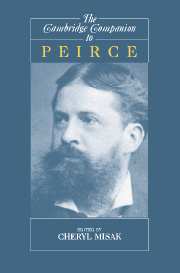Book contents
- Frontmatter
- 1 Charles Sanders Peirce (1839-1914)
- 2 Peirce's Place in Pragmatist Tradition
- 3 Peirce and Medieval Thought
- 4 Reflections on Inquiry and Truth Arising from Peirce's Method for the Fixation of Belief
- 5 Truth, Reality, and Convergence
- 6 C. S. Peirce on Vital Matters
- 7 Peirce's Common Sense Marriage of Religion and Science
- 8 Peirce's Pragmatic account of Perception
- 9 The Development of Peirce's Theory of Signs
- 10 Peirce's Semeiotic Model of the Mind
- 11 Beware of Syllogism
- 12 Peirce's deductive Logic
- Note on References
- Bibliography
- Index
5 - Truth, Reality, and Convergence
Published online by Cambridge University Press: 28 May 2006
- Frontmatter
- 1 Charles Sanders Peirce (1839-1914)
- 2 Peirce's Place in Pragmatist Tradition
- 3 Peirce and Medieval Thought
- 4 Reflections on Inquiry and Truth Arising from Peirce's Method for the Fixation of Belief
- 5 Truth, Reality, and Convergence
- 6 C. S. Peirce on Vital Matters
- 7 Peirce's Common Sense Marriage of Religion and Science
- 8 Peirce's Pragmatic account of Perception
- 9 The Development of Peirce's Theory of Signs
- 10 Peirce's Semeiotic Model of the Mind
- 11 Beware of Syllogism
- 12 Peirce's deductive Logic
- Note on References
- Bibliography
- Index
Summary
INTRODUCTION
Most contemporary philosophers who are sympathetic to pragmatism are anxious to distance themselves from Peirce's pragmatic clarification of the concept of truth as 'the opinion which is fated to be agreed to by all who investigate'. This reluctance is found both in those who follow Dewey and James in giving little role to a 'realist' notion of truth in accounting for our cognitive evaluations and in those who do not take this direction. Why does the suggestion that truth is a matter of fated convergence of opinion seem so unpromising to pragmatists other then Peirce?
One problem concerns ‘buried secrets’ or ‘lost facts’. It seems evident that there are many truths which, we are sure, would not be discovered, however long we inquire into them. Another is that it seems to yield a strange view of what makes some propositions true: whether it is true that an inch of rain fell on the morning of the Battle of Hastings depends upon what evidence will turn up in the future rather than upon meteorological conditions in southern England nearly a thousand years ago. It is also charged that Peirce’s theory obscures an insight which many find central to what makes pragmatism attractive. James’s pluralism suggests that our practical concerns and aesthetic interests have a role in determining whether a system of beliefs agrees with reality; perhaps there are different versions of reality which answer to different practical concerns and are not in competition.
- Type
- Chapter
- Information
- The Cambridge Companion to Peirce , pp. 127 - 149Publisher: Cambridge University PressPrint publication year: 2004
- 16
- Cited by



